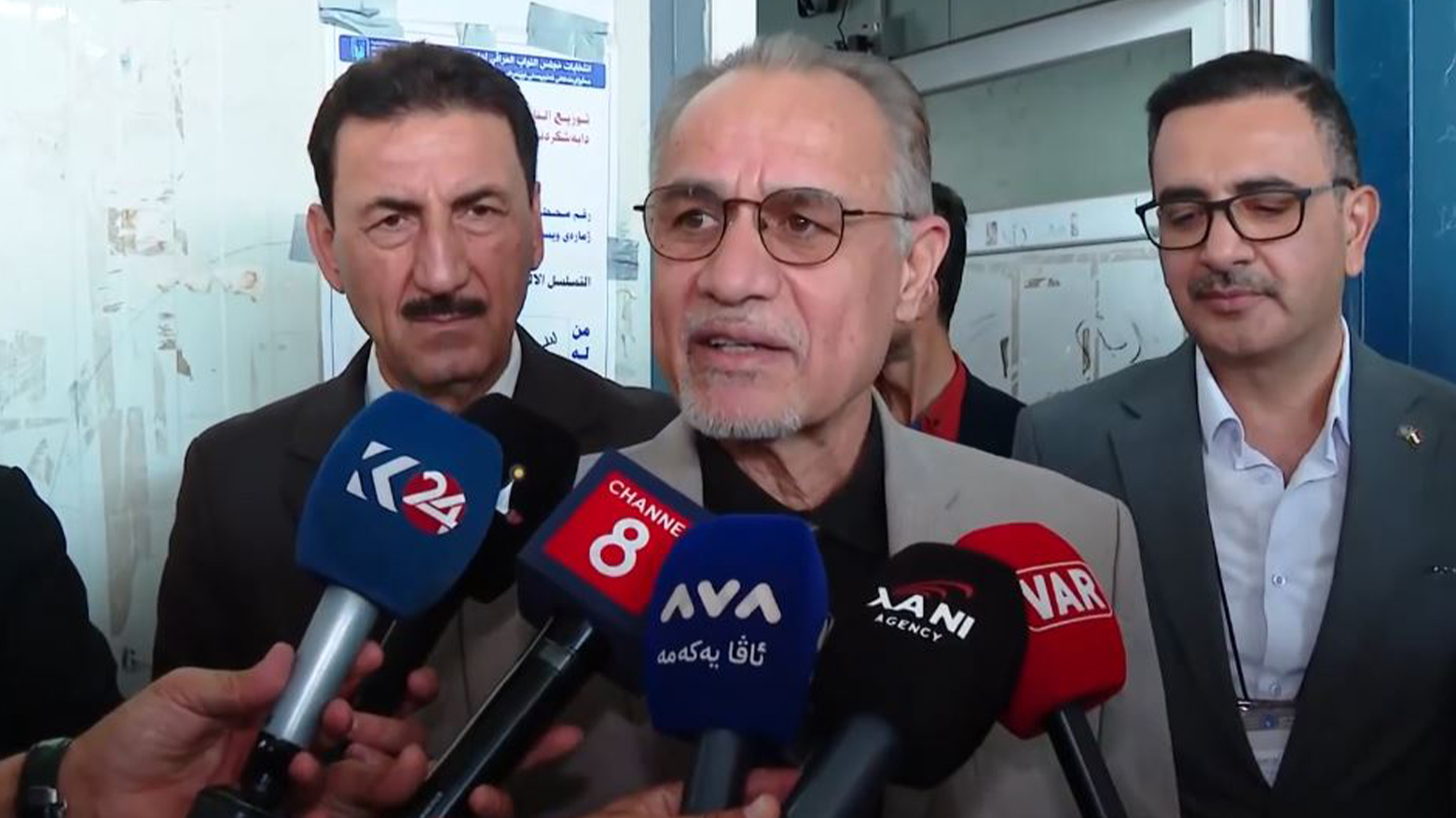UN official: Iraq’s parliamentary vote proceeding within constitutional and legal framework
UN official confirms Iraq's special parliamentary elections are proceeding within the constitutional framework, with a 60.74% turnout. Peshmerga forces voted enthusiastically, with commanders calling the ballot a "new frontline" for Kurdish rights.

ERBIL (Kurdistan24) — Ghulam Ishaq, Deputy Special Envoy of the United Nations Secretary-General for Iraq, said Sunday that the country’s special parliamentary election process is proceeding “in full accordance with the constitution and electoral laws.”
Speaking to journalists while visiting a polling station at Sharya Camp in Duhok, Ishaq said his role was to observe and ensure that voting was taking place within legal and constitutional parameters.
“This process is being fully administered by Iraq,” he stated. “I am here only to observe and ensure that it is conducted within the framework of the constitution and electoral laws.”
He also wished success to all candidates participating in the election.
“I wish all candidates success,” Ishaq added.
Voting began at 7:00 a.m. on Sunday, Nov. 9, 2025, as Iraq held its special parliamentary election for security forces, internally displaced persons (IDPs), and prisoners.
According to the Independent High Electoral Commission (IHEC), 1,313,980 members of the security forces and 26,538 IDPs are eligible to vote in this special phase of the election.
A total of 809 polling centers with 4,501 stations have been prepared for security personnel, while 27 centers with 97 stations have been designated for displaced voters.
The election features 7,744 candidates, although 848 have been disqualified by the commission ahead of the final ballot.
Security and electoral officials confirmed that forces across Iraq and the Kurdistan Region were deployed early in the morning to polling stations to cast their votes and secure the election process.
In a massive and enthusiastic display of civic duty, an estimated 75% of Peshmerga and other security forces in the Kurdistan Region participated in Sunday’s special vote, demonstrating their deep commitment to the democratic process — a development hailed by commanders as the “new frontline in the defense of Kurdish rights.”
The Independent High Electoral Commission of Iraq (IHEC) announced that, as of midday, average voter turnout in special voting across Iraq and the Kurdistan Region had reached 60.74%.
Nabard Omar, head of the Kurdistan Region’s electoral body at IHEC, confirmed the strong turnout to Kurdistan24, describing a “smooth and secure election day” where early technical issues were quickly resolved and an atmosphere of “eager participation” prevailed across the Region’s 958 polling stations.
“Since 7:00 AM, 958 polling stations have opened in the Kurdistan Region and the process is proceeding very well,” Omar said.
“At the beginning of the morning, about four stations had technical problems, but they were quickly resolved and now the process is continuing without any issues.”
Omar emphasized that the rapid resolution of these issues reflects the improved electoral infrastructure and confidence in the process. He noted proactive steps to ensure voter verification, including new biometric and facial-recognition technology.
“To solve the problem of those who had fingerprint issues, we installed a device that reads Face ID,” he explained. “So far, no voter has been unable to participate due to verification problems.”
The spirit of participation among security forces was the most striking feature of the day. Omar said that Peshmerga and police personnel were voting with “great enthusiasm”, responding to the motivational appeals of their commanders.
Earlier, Mansour Barzani, Commander of the First Special Forces Division and Gulan Special Forces, had called on all citizens to “be Peshmerga on the 11th of 11” — the date of the general election — and to use their votes as weapons to defend their constitutional rights.
The same message was echoed by other senior officers, including Sihad Barzani, who said “the only way to defend our people’s rights is through voting and the democratic process,” and Rawan Barzani, who declared that “the Peshmerga are now defending their rights with their vote.”
The robust turnout was seen as a direct response to these calls — a clear indication that Kurdistan’s defenders have embraced democracy as their newest frontline.
Omar also highlighted the significant international monitoring presence, confirming that 1,100 international observers were registered in the Kurdistan Region to oversee the vote.
“They are visiting the polling stations and closely monitoring the process,” he said, describing it as a strong guarantee of transparency and integrity.
He further explained the secure automation of the voting system:
“At 7:00 AM, the machine starts working on its own and at 6:00 PM it turns itself off, and after that, the result is issued,” Omar said, emphasizing safeguards against human interference.
While praising the overall process, Omar raised one key security concern — the use of mobile phones inside voting rooms.
“We have requested that mobile phones not be taken into the voting room under any circumstances,” he said. “Security forces must ensure this rule is enforced to protect ballot secrecy.”
The participation of female Peshmerga also stood out, as they voted alongside their male colleagues, praising the efficiency of the process. One female fighter told Kurdistan24 that she was able to vote “in just a few minutes”, calling the experience a reflection of “the progress of our struggle and our right to decide our future.”
As the polls closed at 6:00 p.m. and the automated system began compiling results, the Kurdistan Region’s special election was widely regarded as a resounding success.
The 75% turnout, the flawless technical execution, and the enthusiasm of the security forces together marked a powerful step forward — a clear demonstration that Kurdistan’s protectors have embraced the ballot box as the most vital tool in securing the Region’s democratic and prosperous future.